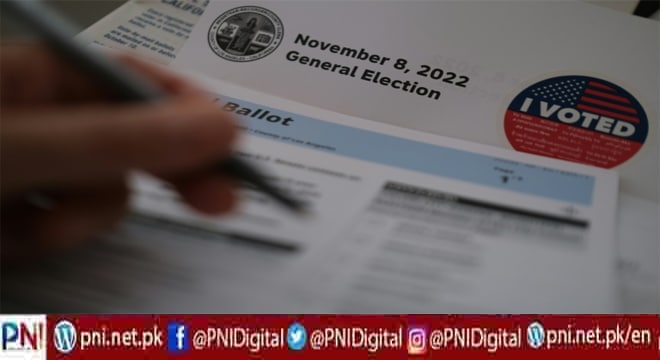Washington/Mexico City, Nov 4 (AFP/APP):Shared among relatives and people they trust — that is how misinformation often moves among the estimated 34.5 million Americans of Hispanic origin eligible to vote in US midterm elections on November 8, experts say, with the specter of communism a common narrative.
Those contributing to the spread regularly appeal to the emotions of a community in which authority and familiarity play a fundamental role, with politicians looking to garner support with messaging that tugs at the heartstrings.
Misinformation evoking painful memories — such as the communist or socialist regimes which the families of many Hispanic Americans left behind to come to the United States — can quickly proliferate among a group that makes up around 14 percent of the US electorate.
Maria Corina Vegas, a Venezuelan living in Miami, Florida, says she receives numerous text messages associating the Democratic Party of Joe Biden with the “Chavista radical Left,” a reference to former socialist Venezuelan president Hugo Chavez.
Constant streams of polarized content cause family friction, according to Vegas.
“It has led me to avoid discussions,” she said, noting that some family members cannot stop themselves from arguing about the messages they’ve seen.
Vanessa Cardenas of America’s Voice, an immigrants’ rights organization, told AFP that purveyors of misinformation know false and misleading content can discourage electoral participation. Yet the very same information “is more credible when it comes from people you trust.”
This explains how Hispanics in the US are vulnerable to misinformation on WhatsApp, an encrypted messaging app used by 20 percent of the community, according to a survey by Equis Institute.
WhatsApp “is where family and people you trust are,” said Julio Rivera, head of campaigns for the NALEO Educational Fund, which promotes the participation of Latinos in US elections.
Cynthia Perez of Cubanos Pa’lante, an organization that encourages “progressive Cuban-Americans” to vote in Florida, agreed.
“The first generations of Latinos (to arrive in the US) have a lot of respect for authority,” she said.
“When they listen to the president, the governor, or a police officer, they don’t automatically think that person is telling lies. And they believe them because they are people they trust.”
– Fear of communism Although many misinformation narratives circulating ahead of the midterms are translated from English, others are created or adapted to exacerbate feelings in Hispanic communities, analysts say.
For example, many Cuban and Venezuelan emigres fleeing communism and socialism are the targets of campaigns spreading fear that what happened in their countries could happen in the US if they vote for certain candidates, Rivera said.
Evelyn Perez-Verdia, head of strategy at the consulting firm We Are Mas, echoed the same concern.
“The actors who create misinformation, domestic or foreign, understand the pain that word — communism — causes the Latin American or Caribbean community,” she said.
“In 2018, they started accusing anyone who was a Democrat, even right-wing centrists, of being socialist-communist because it immediately created fear in the community.”
As of that year, there were 1.3 million Cubans in the US, according to official data. There were more than 540,000 Venezuelans as of 2021, according to R4V, a platform for refugees and migrants from Venezuela co-led by the UN.
The evocation of communism has been visible in midterms campaigning, with Republicans such as US Congresswoman Mar韆 Elvira Salazar of Florida characterizing Biden as a far-left politician.
Other posts circulating on WhatsApp make false claims about voting and abortion rights, particularly following the US Supreme Court’s reversal of Roe v. Wade, raising fears that vulnerable people will not seek medical attention when they need it.
Part of the problem, Rivera said, is that more resources and controls are needed to stop the flow of misinformation in Spanish in the US since such content “stays up longer” online compared to claims in English.
A report by Avaaz, an activist group that studies disinformation, indicates 70 percent of inaccurate content in Spanish on Facebook did not receive warning labels, compared to 29 percent in English.
On WhatsApp, news organizations such as AFP have established tip lines to fight disinformation by answering users with reliable information and facts.
Follow the PNI Facebook page for the latest news and updates.









